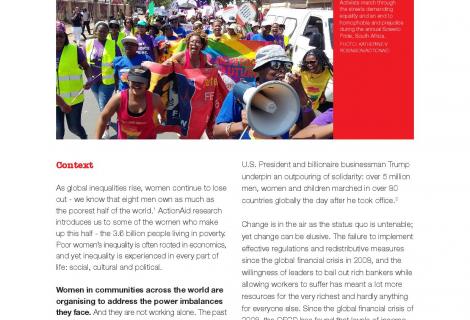
As global inequalities rise, women continue to lose out - we know that eight men own as much as the poorest half of the world. ActionAid research introduces us to some of the women who make up this half - the 3.6 billion people living in poverty. Poor women’s inequality is often rooted in economics, and yet inequality is experienced in every part of life: social, cultural and political.
Women in communities across the world are organising to address the power imbalances they face. And they are not working alone. The past months have seen the rise of a global movement against inequalities and the rise of people’s movements which are pushing back against a status quo and power dynamic that favours only the very rich and very powerful. For example, horror at the reactionary and discriminatory plans of U.S. President and billionaire businessman Trump underpin an outpouring of solidarity: over 5 million men, women and children marched in over 80 countries globally the day after he took office.
Change is in the air as the status quo is untenable; yet change can be elusive. The failure to implement effective regulations and redistributive measures since the global financial crisis in 2008, and the willingness of leaders to bail out rich bankers while allowing workers to suffer has meant a lot more resources for the very richest and hardly anything for everyone else. Since the global financial crisis of 2008, the OECD has found that levels of income inequality within and between countries are the worst they’ve been in half a century. And economic discrimination against women is so bad that at the current rate of progress it will take 170 more years for women to receive pay equal to that of men.
The problem of inequality is structural. Systems of governance, of finance, and of social order are devised and maintained by those who already have wealth and power, who make the rules in order to consolidate their privilege.
However, we are seeing some opportunity. We’re seeing people stand together more than before. Women in mining affected communities in South Africa have been organizing to use tools including the equality courts - set up by the constitution to achieve more balanced power and economic outcomes post-apartheid, but still under-used - to organize against the violence and discrimination that affects them on a daily basis. Originating in black US communities, the now-international activist movement #BlackLivesMatter campaigns against violence and racism experienced by black people and is continuing to effectively raise awareness and stage direct actions.
Governments and civil society groups can recognise and support these movements and their demands around access to quality public education and public services that meet the needs of women. And we know how to raise the resources: tax.
More tax-funded spending on healthcare and education is closely related to lower tolerance and incidence of violence against women; a reduction in women’s unpaid care work; a reduction in the preference of parents to send boys to school; and a greater representation of women in politics. It is estimated that developing countries lose an estimated $200 billion a year to tax avoidance by big companies every year. And ActionAid estimates that an additional $138 billion is given away in tax breaks to companies. When public services are starved of funding, it’s women and girls who pay the highest price.
ActionAid’s research introduces us to the women patriarchy would leave behind: women who face intersecting inequalities and who will stand with others for the International Women’s Day call to action and ‘Be Bold For Change’.